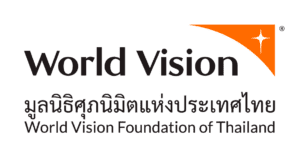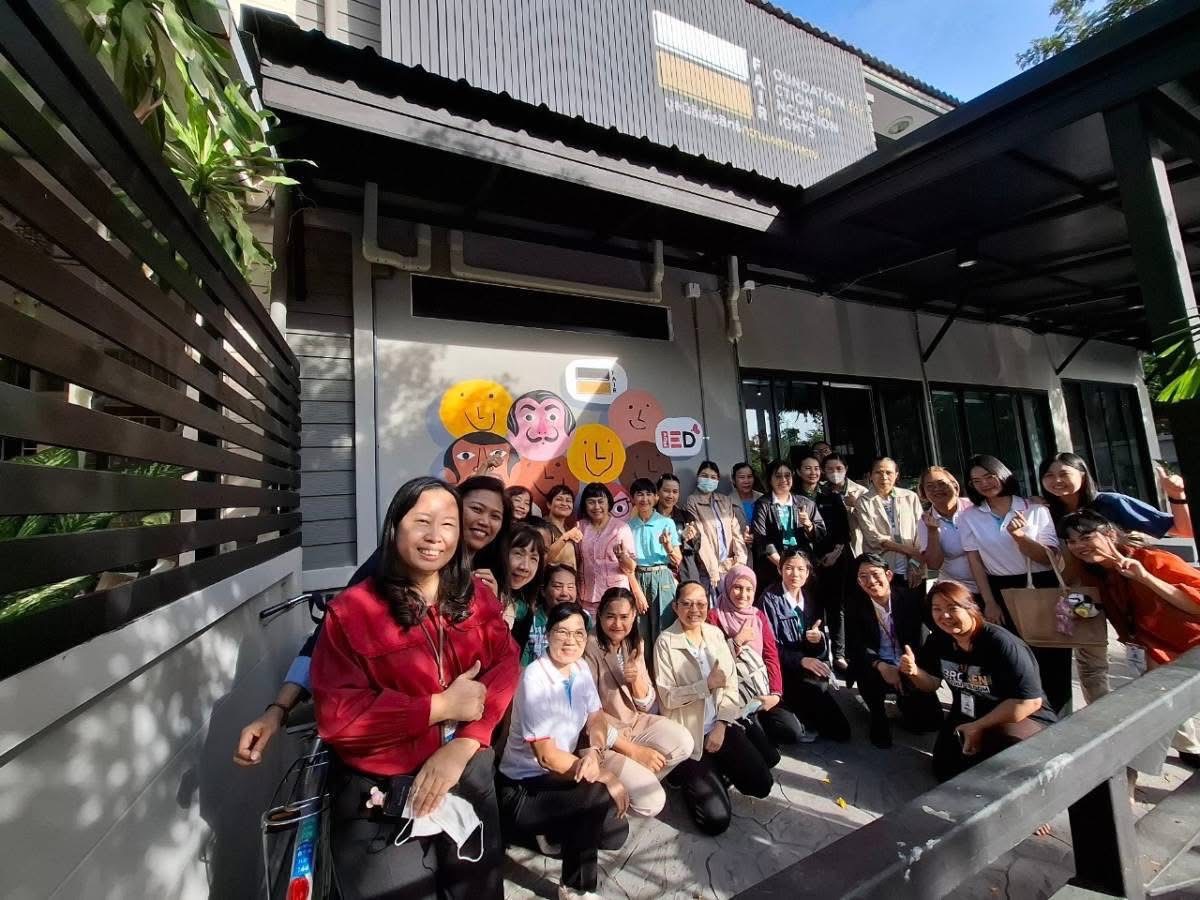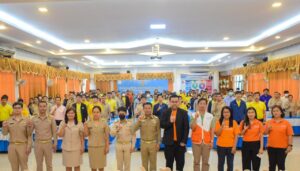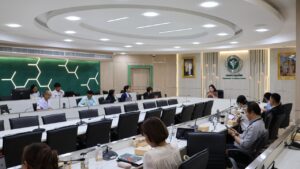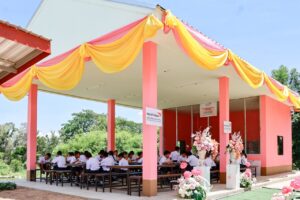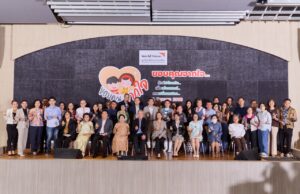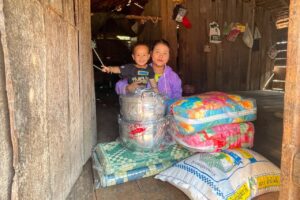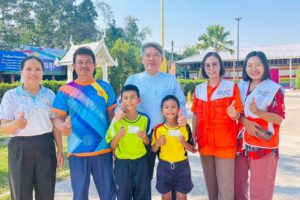In Thailand, although access to healthcare services has steadily improved, certain population groups, especially key populations at high risk of tuberculosis (TB) and HIV, continue to face exclusion from the health system due to stigma and discrimination. Addressing these issues effectively requires grassroots-responsive mechanisms, which led to the creation of ‘Baan Samer,’ an operational model focused on protecting human rights, gender equity, and building a sustainable health system from community to community.
Baan Samer: A Safe Space Co-Created by the Community for Rights, Equity, and Well-being
Equal access to rights and health services remains a challenge, particularly for vulnerable groups such as people living with HIV, people who use drugs, and TB patients, who often face stigma and discrimination. With over 30 years of experience in HIV-related rights work, Foundation for Action on Inclusion Rights (FAIR), in collaboration with the Department of Disease Control and partners from both government and civil society, developed the ‘Sawaddee Pokpong’ Crisis Response System (CRS) in 2019. This system receives complaints and protects against rights violations related to AIDS, sexual health, and vulnerable populations, and was initially implemented in 14 provinces.
In 2024, FAIR expanded this system into ‘Baan Samer’ under the project ‘Stop TB and AIDS through RRTTPR year 2024-2026’, supported by the Global Fund and World Vision Thailand. The aim is to eliminate human rights and gender-related barriers to accessing TB and HIV services. ‘Baan Samer’ acts as a frontline mechanism for receiving complaints, recording facts, providing information and counselling, and referring cases to relevant agencies. It operates through a multidisciplinary team of specialists and offers services in four main areas:
· Rights, legal, and anti-discrimination services
· Harm reduction services for drug use
· Sexual and reproductive health services
· Mental health and well-being services
The core of Baan Samer lies in designing services that understand the needs of service users, emphasising co-development with target groups (Targeting Triage), diversity, intersecting identities, and individual contexts. This ensures effective and context-appropriate operations based on veracity aligned with community values. With data-driven work, systematic analysis, and cross-disciplinary collaboration, Baan Samer can manage rights violation cases systematically and drive effective policy advocacy.
The Home That is Equal for All
The name ‘Baan Samer’ carries dual meanings: ‘Samer’ means equality, and ‘Baan’ (home) represents a place that welcomes everyone unconditionally, regardless of their circumstances. This model is more than a complaint and protection mechanism—it is a safe space driven by the community (Community-led Human Rights and Gender Service Model: CLHRGS) to eliminate stigma and discrimination against vulnerable populations such as people who use drugs, people living with HIV, and TB patients. ‘Baan Samer’ also plays a vital role in empowering individuals who face dehumanisation and discrimination, helping them develop skills to prevent repeated violations and access timely support. This is a community-powered initiative to protect rights, restore well-being, and reduce discrimination and human rights violations caused by TB, HIV, and related factors through proactive, systematic, and sustainable policy approaches.
‘Baan Samer’ reflects the integration of human rights, sexual health, and anti-stigma and anti-discrimination efforts related to TB and HIV through a community-driven mechanism. Its concept aligns with both global and national health strategies, such as:
Global AIDS Strategy 2021–2026
World Health Organization’s End TB Strategy
Thailand’s National AIDS Elimination Action Plan 2023–2026
National TB Elimination Action Plan Phase 2 (2023–2027)
The Global Fund’s approach to supporting Community-Led Crisis Response Systems (CRS) and Resilient and Sustainable Systems for Health (RSSH)
In a health system led by communities, people are not just service recipients but co-designers, monitors, and evaluators of health interventions. Community participation enables:
Identification of real problems and barriers through lived experiences
Effective linkage with government services and partners
Empowerment of community members to understand and protect their rights
Strengthening ‘Baan Samer’: The Role of World Vision Thailand in Connecting Resources, Partnerships, and Communities
Under the project ‘Stop TB and AIDS through RRTTPR year 2024-2026’, supported by the Global Fund, World Vision Thailand has played a key role in strengthening ‘Baan Samer’, implemented by FAIR. This is a community-level mechanism designed to address vulnerabilities across multiple dimensions—health, rights, and legal status. As the Principal Recipient of Global Fund support, World Vision Thailand systematically allocates funding to implementing agencies in the field and supports the development of essential tools for community-based work, such as vulnerability assessment toolkits and data reporting systems. These tools enable effective monitoring, evaluation, and evidence-based policy planning that aligns with real-world contexts.
At the same time, World Vision Thailand serves as a central mechanism linking Baan Samer’s operations with networks of government agencies, civil society, and stakeholders at both local and national levels. This support aims to develop Baan Samer into a stable and sustainable support mechanism, not merely a temporary project-based initiative, but an integrated space for health care, rights protection, and the elimination of stigma and discrimination against vulnerable populations. This foundation is crucial for reducing the spread of TB and HIV in Thailand in the long term. The strength of Baan Samer, as a proactive community mechanism aligned with national policy, will play a vital role not only in increasing access to treatment but also to address the underlying issues, leaving no one behind, by 2030 for HIV and 2035 for TB, in line with national targets and the Sustainable Development Goals (SDGs). Through collaboration among civil society, government, and NGOs, ‘Baan Samer’ demonstrates that community-led health and human rights initiatives can drive tangible and sustainable change.
Outcomes and Challenges of ‘Baan Samer’ Implementation
Between October 2024 and March 2025, ‘Baan Samer’ assisted a total of 111 cases, with most service users being key populations such as people living with HIV, people who use drugs, and migrants, primarily Thai nationals. The most utilised services were harm reduction and sexual and reproductive health services, followed by rights and legal services. Most users contacted Baan Samer through its hotline. These results reflect the effectiveness of proactive outreach in reaching target groups and directly addressing issues in the field. Additionally, all service users underwent mental health screening, received individual counselling, and participated in group support activities to enhance overall mental well-being.
Despite the expansion of the CRS system to more provinces, local mechanisms still fall short of fully meeting community needs. Rights issues are not yet systematically integrated into community services. Key challenges include:
Lack of community capacity development for case intake and data management
Case management is not yet linked to preventive service planning
Data use remains focused on reporting rather than driving development
Fragmented operations among agencies, lacking data and strategic integration
The collected data does not yet fully reflect the values or needs of each community and cannot be deeply analysed to inform policy-level service adjustments or fully leverage big data. These challenges highlight the need to strengthen and equip such mechanisms with resources to make human rights a fundamental issue that communities can manage themselves, with support from both local and national agencies.
The Next Steps for ‘Baan Samer’
‘Baan Samer’ aims to elevate rights, legal, anti-discrimination, and well-being services to become an integral part of the mainstream service system. Its four key strategic directions are:
· Enhancing Service Quality and Standards: Advocate for rights and anti-stigma services to be recognised not as “ad hoc” efforts but as core services with clear, auditable standards that can be continuously developed over the long term.
· Leveraging Technology for Targeted Development: Apply data and technology to effectively identify target groups, ensuring services are targeted, timely, and crisis-responsive. Systematic data synthesis will also support policy advocacy that reflects real needs in local contexts.
· Driving Sustainable Support Systems: Build understanding and collaboration with policy-setting agencies such as the National Health Security Office (NHSO) to have these services recognised as well-being services eligible for budget allocation. A transition plan will be developed to prepare for long-term integration into stable support systems.
· Raising Public Awareness of Rights: Promote public understanding of individual rights (Know Your Rights) so people can protect themselves from violations and access help promptly.
‘Baan Samer’ is a vital model for reducing stigma and discrimination, increasing access to justice, and providing essential TB and HIV services—especially for often-overlooked key populations. In the future, ‘Baan Samer’ will not be a single service point but will expand to other community-based organisations nationwide. It will integrate with existing health systems in a standardised, robust, and continuous manner to help Thailand achieve its goals of ending TB and HIV in line with national strategies.
